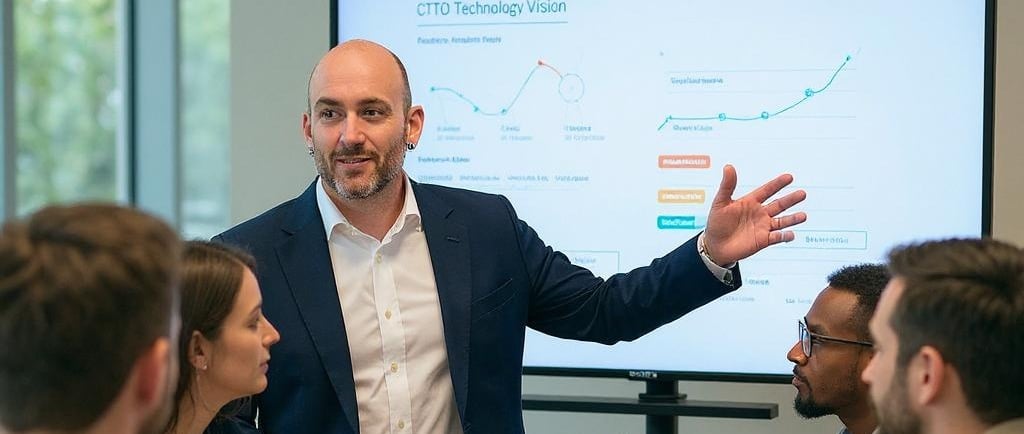The CTO Skills That Matter in 2025: Why Modern Leadership Is Your Startup’s Secret Weapon
In 2025, the Chief Technology Officer isn’t just the “tech person” in the room. The best CTOs—especially fractional ones—are business leaders first, technologists second.
8/19/20253 min read


The CTO’s Role: More Than Just Tech
In 2025, the Chief Technology Officer isn’t just the “tech person” in the room. The best CTOs—especially fractional ones—are business leaders first, technologists second. Their job is to bridge the gap between ambitious business goals and the messy realities of code, teams, and technology choices.
But what does that actually look like in practice? What skills set apart a CTO who delivers real value from one who just manages tickets?
Let’s break down the essential skills and concepts every business leader should expect from their CTO, whether full-time or fractional.
1. Business-First Thinking
Why it matters:
A CTO should drive business outcomes, not just technology projects. The best CTOs obsess over metrics like revenue, customer acquisition cost, and uptime—not just code quality or system uptime.
In action:
A fractional CTO brings an outsider’s perspective, quickly aligning tech priorities with what moves the business forward. They’ll ask: “How does this feature help us hit our quarterly targets?” or “What’s the fastest path to ROI?”—and cut through technical noise to deliver results.
2. Strategic Technology Leadership
Why it matters:
Tech moves fast, but not every shiny tool is worth chasing. Modern CTOs must separate hype from substance, balancing innovation with stability.
In action:
Expect your CTO to introduce frameworks for evaluating new technologies (think: AI, serverless, low-code), but also to say “no” when a trend doesn’t fit your business model. Fractional CTOs, exposed to multiple industries, are especially adept at cross-pollinating best practices—bringing in what works elsewhere, and skipping what doesn’t.
3. Building and Scaling Teams
Why it matters:
A CTO’s true legacy is the team they build. In 2025, this means recruiting, developing, and retaining talent in a hybrid or remote world.
In action:
Fractional CTOs often step in when teams are stuck—maybe the founder is acting as CTO, or the company has outgrown its original structure. They’ll quickly spot gaps: Is there too much reliance on one “hero” engineer? Is documentation missing? Are you burning out your best people?
They’ll implement org changes, introduce clear ownership, and set up lightweight processes so teams can move fast without chaos.
4. Technical Debt Management
Why it matters:
Every startup accumulates technical debt. But left unchecked, it kills velocity and frustrates the business.
In action:
A skilled CTO will quickly map your tech debt, prioritize what’s business-critical (e.g., payment pipelines, customer data security), and set up processes to tackle it without slowing down new feature delivery. Fractional CTOs excel here—they’re used to jumping into messy codebases and delivering quick wins.
5. Security, Compliance, and Risk Management
Why it matters:
Regulations (GDPR, HIPAA, SOC 2) and security threats are only getting tougher. Ignoring them isn’t an option.
In action:
Modern CTOs bring a playbook for security reviews, incident response, and compliance—right-sized for your stage and industry. Fractional CTOs, who see patterns across companies, can quickly spot gaps and implement practical, business-focused solutions.
6. Data-Driven Decision Making
Why it matters:
Gut instinct is great, but the best CTOs use data to guide priorities—tracking DORA metrics (deployment frequency, MTTR), team velocity, and R&D spend as a percentage of revenue.
In action:
Expect your CTO to implement dashboards, regular reporting, and a culture of measurement—so you know what’s working, and where to double down.
7. Communication and Change Management
Why it matters:
Tech initiatives fail when communication breaks down. The CTO must be a translator—making complex topics accessible to non-technical stakeholders, and aligning teams behind a shared vision.
In action:
Fractional CTOs are often brought in to “unstick” teams or lead through transitions (post-funding, M&A, leadership changes). Their outside perspective and communication skills help build trust, reduce resistance, and keep everyone rowing in the same direction.
Why Fractional CTOs Are Winning in 2025
Fractional CTOs bring a unique blend of battle-tested experience, cross-industry perspective, and outcome-driven leadership. They’re not just “consultants”—they’re co-pilots for your business, focused on getting you to the next stage faster, and with less risk.
Key benefits:
Rapid ramp-up and fresh perspective
Access to best practices from multiple industries
Outcome-based engagement (not just hours billed)
Flexibility to scale up or down as needs change
Final Thoughts
The CTO skills that matter in 2025 aren’t just about technical chops—they’re about driving business results, building resilient teams, and leading through change. Whether you’re hiring full-time or bringing in a fractional leader, look for someone who can deliver on these fronts.
If you’re a founder or operator feeling stuck, don’t settle for a CTO who just “keeps the lights on.” The right leader can transform your business—and a fractional CTO might be the fastest way to get there.
There for the hurry not the wait
matt@foundryfractional.com
+1-206-480-8525
© 2025. Foundry Fractional. All rights reserved. Functional Technology TM & Copyright © 2024 CTOx LLC. All rights reserved.
